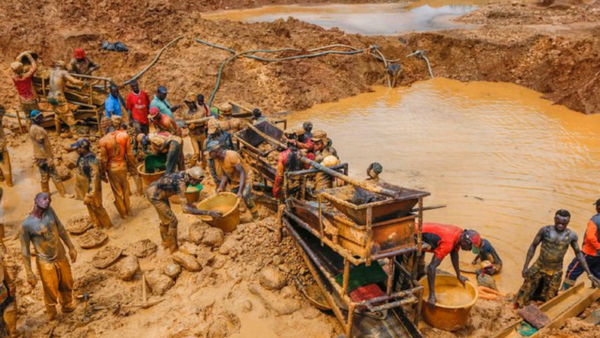|
Getting your Trinity Audio player ready...
|
Ghana, once celebrated for its rich cultural heritage and abundant natural resources, now grapples with a crisis that threatens the very essence of its existence: illegal mining, commonly known as “galamsey.” This scourge has wreaked havoc on the environment, particularly the nation’s rivers and water bodies, leaving a devastating legacy that may take over a millennium to rectify.
The picturesque landscapes of Ghana are marred by the destructive practices of galamsey, where unregulated mining operations have contaminated rivers and streams. The water bodies, once teeming with life, have now become toxic wastelands. Deadly minerals, including mercury and arsenic, seep into the water, creating a cocktail of pollutants that will persist for approximately 1,000 years. Future generations—tenfold—will bear the brunt of this environmental disaster, as the waters remain undrinkable and ecosystems struggle to recover.
The human impact of illegal mining extends far beyond environmental degradation. In the relentless pursuit of gold, there are harrowing accounts of young men, women, and even children who are sacrificed in a bid to appease supernatural forces believed to bring luck in mining ventures. Disturbingly, some mining groups operate under the chilling belief that the blood of innocents enhances their fortunes, leading to a grim reality where lives are extinguished for gold.
Families are shattered, communities torn apart, and countless lives lost in this dark practice, where desperation and superstition converge. The tragedy doesn’t stop at the loss of life; the mental and emotional scars left on communities are profound and long-lasting.
Perhaps most disturbing is the complicity of local leaders and influential figures who turn a blind eye or actively support these illicit activities for personal gain. Corruption runs deep, as some officials prioritize profit over the wellbeing of their constituents, allowing illegal operations to flourish unchecked. This betrayal of trust not only enables the continued destruction of the environment but also perpetuates a cycle of poverty and exploitation among vulnerable populations.
While the government has made attempts to crack down on illegal mining, the effectiveness of these measures remains questionable. With deep-rooted corruption and a lack of genuine political will, meaningful change seems elusive. The very leaders tasked with safeguarding the country’s future are, in many cases, the ones undermining it.
The situation in Ghana demands urgent attention and action. There must be a concerted effort to address the root causes of illegal mining, including poverty, lack of education, and insufficient job opportunities. Empowering local communities through sustainable alternatives is vital to breaking the cycle of exploitation.
Furthermore, transparency and accountability in governance must be prioritized. Citizens should demand that their leaders act in the public interest, holding them accountable for their roles in the illegal mining crisis.
Illegal mining in Ghana is a multifaceted crisis that threatens the environment, public health, and the very fabric of society. The rivers are poisoned, lives are lost, and a cycle of corruption continues unchecked. Only through collective action and responsible leadership can Ghana hope to reclaim its waters and secure a brighter future for generations to come. The time for change is now.


